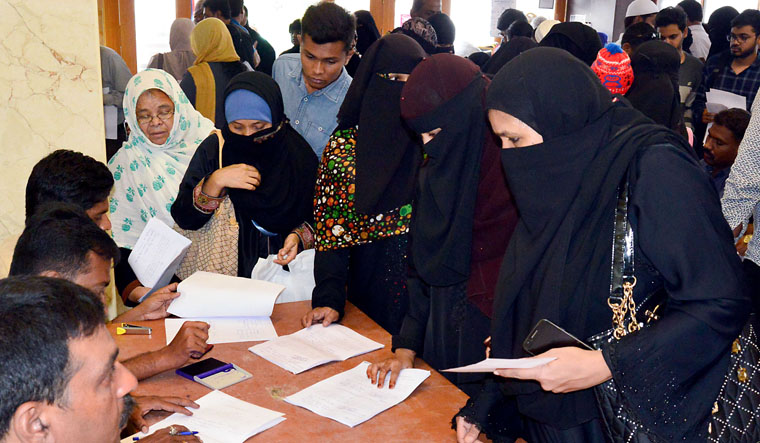M. A. Siraj
Bengaluru: It is one year since the collapse of the Bengaluru based I Monetary Advisory (IMA) Investment Company, but not a single of the nearly 80,000 investors has received his/her deposits back.
It was on June 9 that the news of IMA Chairman Mohammad Mansoor Khan fleeing India hit the investors like a bombshell. When the offices and jewellery showroom of the company on Lady Curzon Road in downtown Bengaluru did not open on June 9, last year—after 4-day Eidul Fitr holiday—the investors gathered in large numbers and demanded action against the company directors.

Promise of halal returns
According to the IMA’s prospectus, the company was set up somewhere in 2006 and had attracted deposits and investments from over 12,000 investors till 2015 promising halal (Islamically permissible) income and salvation from riba (generally translated as ‘Interest’). Latest estimates made by the investigation team claim that nearly 80,000 individuals had deposited money in the company till it collapsed last year shutting down its showrooms, companies, hospitals, schools and publication centres. According to Mr. Harsh Gupta, a senior IAS office heading the Special Competent Authority set up by the Government of Karnataka, it has begun the process to identify the depositors and investors of the company and return their deposits after liquidating the available assets of the company. The evaluation of the claims filed till May 31, 2020 by the investors, the group of companies owes them around Rs. 2,900 crore.
It is also reported that several early investors and depositors have received what is claimed to be ‘dividends’ from the company much more than what they had invested. The total value of movable and immovable assets confiscated by the Authority after the collapse of the company is assessed to be around Rs. 450 crore. The Authority is yet to calculate the sums already disbursed as ‘dividends’ by hundreds of investors and will seek the opinion of financial and company affairs experts if such investors can be excluded from claimants who have not received any returns.
Ponzi character
The huge Ponzi scheme launched by Mansoor Khan, a small time merchant prior to floating the IMA, had lured thousands of Muslims from poor and lower-middle class into investing in or depositing considerable sums with the company through powerful marketing and by promising dividends no other businesses or companies could match. The element of appealing to religious sentiments was too evident to be missed in the campaign. The company had even promised ten per cent monthly return on investment thereby implying that the entire sum would be back with investors within ten months.

Several moulvis, politicians and Urdu dailies had mobilized public opinion in favour of the company. Imam of the Beoparian Mosque in Cantonment area, Maulana Haneef Afsar Azeezi was arrested on July 12, 2019 in connection with the scam and spent six months in detention in the Ballari Central Prison before getting released on bail.
According to the Special Investigation Team (SIT), Haneef had allegedly misused the religious faith of the people and encouraged them to invest in IMA. ‘Going by his words, hundreds of people invested in IMA,’ a report in the media had stated. It was also alleged that Mansoor Khan, had gifted him a house worth Rs. 3 crore at HBR Layout in exchange for luring people to invest in his company.
Another noted cleric Mufti Shuaibullah Khan, muhtamim (rector) of Jamia Maseehul Uloom, even wrote books legitimizing the company’s business. Mansoor Khan had donated a computer lab to Darul Uloom Deoband.
Pliant fatwas
Curiously, three clerics namely Mufti Muntazirul Hassan of Darul Uloom Zakaria, Deoband; Muhammad Anees Khan, Muhtamim, Madrassa Mazahirul Uloom, Salem; and Maulana Abul Kalam, Chief Qazi of Salem had issued a statement on October 25, 2018 expressing their ‘satisfaction’ about IMA’s businesses being shariah-compliant. The statement was carried by Urdu daily Salar in its issue dated October 26, 2016 with a full-sheet display of several photographs. The statement said the trio visited and inspected the company at their own will. It had rejected as baseless the fears and rumours from some quarters (and a section of the press) that the company’s total assets and finances deployed for transaction were far less than the total investment. Three prominent politicians in the State—former ministers Mr. Roshan Baig, B. Z. Zameer Ahmed Khan, R. V. Deshpande—had appeared in several programmes such as launching ceremonies of the showrooms and Mushaira and Iftar hosted by the IMA.
Scared by tapering returns

The monumental fraud against people went on for full 13 years. The IMA opened two jewellery showrooms in up market areas of Bengaluru, entered real estate and construction business, launched the ‘Mulberry Green’ supermarket chain, floated a perfume company, set up ‘Frontline Pharma’ chain of pharmacies and adopted government schools and turned around their infrastructure. Large number of gullible Muslims from districts in Rayalaseema in Andhra Pradesh, North Arcot district of Tamil Nadu and from districts of Kolar, Tumkur, Mysore, Hassan and Ramanagram in Karnataka got snared into the vortex and invested in the IMA. While the company was doling out as much as 10% returns a month in the beginning, it tapered down to 1% by January 2019. Panic began to be perceived in February-May 2019 when the company did not remit any ‘dividends’ in the investors’ accounts. In a first-page statement carried by an Urdu daily on May 25, 2019, Mansoor Khan, Managing Director of the IMA Group of Companies, had tried to counsel patience among investors. He had attributed the non-remittance of ‘profits’ to disruption caused by the General Elections which had choked the flow of funds and had termed it a ‘temporary phase’. Two days prior to it, Maulana Maqsood Imran, peshimam of the City Jama Masjid, had described the services of the IMA to the community as ‘exemplary’ and had assured the readers (read investors) that the company stood on sound footing. He had debunked the allegation being raised in certain quarters and said it was wrong to interpret the ‘temporary lull in returns from the company’ as definitive downturn in its fortunes.
ED’s warnings ignored
However, the collusion of certain official agencies in exercising leniency and also periodically giving clean chit, also encouraged the IMA to continue its dubious activities. An Enforcement Directorate official is on record to have said that the IMA Group was not carrying out any business to pay the promised monthly dividend on investment received from more than 40,000 people. It also accused Khan and other group directors of diverting huge amount in various accounts and acquired various immovable and movable properties in their names. Apart from these, Khan had deposited Rs. 44 crore in cash in various bank accounts after demonetization which was detected by the Income Tax Department. The ED had been exploring the possibilities of invoking Fugitive Economic Offenders Act, a report in Deccan Herald (June 29, 2019) had indicated.
State’s clean chit
Interestingly, Economic Offences Wing of the State CID had given a clean chit to the IMA in 2017. The report by the then CID Inspector General Hemanth Nimbalkar had not found any shortcomings in the manner in which IMA was operating and noted that no investor had come forward to file a complaint against IMA. The report had been filed in response to the RBI’s petition to the State Government seeking its investigation into the company’s affairs based on the “input received by RBI from various sources.” Significantly, FIRs were registered against Nimbalkar and Deputy Commissioner of Police Ajay Hilori and three other police officers in February this year for not conducting proper inquiry and closing the case in August 2018, giving a clean chit to IMA.
Later investigations have revealed that the Group deployed several obfuscating techniques. While the terms and conditions of the agreement were written under the IMA letterhead, deposit slips were issued under IMA Credit Cooperative Society. Most investors were ignorant of the basic difference between the two entities. This allowed the IMA to evade tax and seek exemptions from financial regulations and thereby enabling it to ward off prosecution in case the IMA suffered losses.
Vice-like grip on Urdu media
Having patronized the Urdu dailies, IMA had established a vice like grip over the content appearing in the media. Mr. L. C. Nagaraj, Assistant Commissioner of Police in a media report had alleged that a leading Urdu daily refused to accept a public notice in 2018 alerting the public that the IMA was perpetrating a fraud and appealed to the public to file complaints against the company if they had evidence. No one came forward. However, a little known journal Meyar-e- Gulistan had frequently highlighted the fraudulent practices and fudging of accounts by the IMA. In its issue dated February 4, 2018, the journal had reported that the IMA Bullion Trading Services Ltd had incurred losses during 2016-17 (providing reference to its Audit Report), and questioned as to how the company kept paying ‘returns’ to the investors. The Audit Report issued by Iqbal & Company had not mentioned any investors.
Halal camouflage
But the larger question that the entire scam has raised is one about promise of ‘halal’ investments being used as a camouflage by fraudsters. It is unmistakable that the Quran prohibits Riba which is interpreted as modern day interest charged or given by the bank on loans and deposits respectively. A slew of ‘halal’ investment companies have been seen emerging on the horizon of Bengaluru during the last one decade. Almost all of them turned out to be proverbial ‘blade’ companies having vanished after duping the investors. Ambidant Marketing, Injaz International, Ajmera Group, Hira Gold, Morgenall and a few others mobilized thousands of crore of rupees. Gullibility of Muslims too has to be blamed for the success of these fly-by-night operators for having fallen victim to the lure of unreasonably high ‘profits’, ‘returns’ or ‘dividends’ and failing to seek any expert advice or exercising due diligence. Some individuals and families had raised money by selling their properties or gold ornaments as ‘returns’ were far in excess of appreciation in value of these physical assets over a period of time.
Over and above these, the blade companies conveniently used Islamic symbols to impress their religious credentials on the innocent investors. Mansoor was rarely seen in any attire other than kurta, pyjama, cap. Entire sales staff in the jewellery showrooms used this attire as uniform. IMA Publishers was even printing the copies of Holy Quran and distributing them free of cost. Leading ulema were often seen in his company. The IMA even paid for a full-page obituary with a picture of former Ameer-e-Shariat of Karnataka Mufti Ashraf Ali in a leading Urdu daily of Bengaluru in its issue of September 9, 2017 mourning the death of this leading divine with its company logo placed in a corner of the black print. Several religious events were sponsored by the Group to enhance its sentimental appeal.
The halal scam has dispossessed the Muslims of Bengaluru of a generation’s savings. It has broken up marriages, created acrimonies in well integrated families and forced people to shift out of the expensive city homes to outskirts where economic opportunities are scarce.
M.A. Siraj is a senior journalist based in Bengaluru

